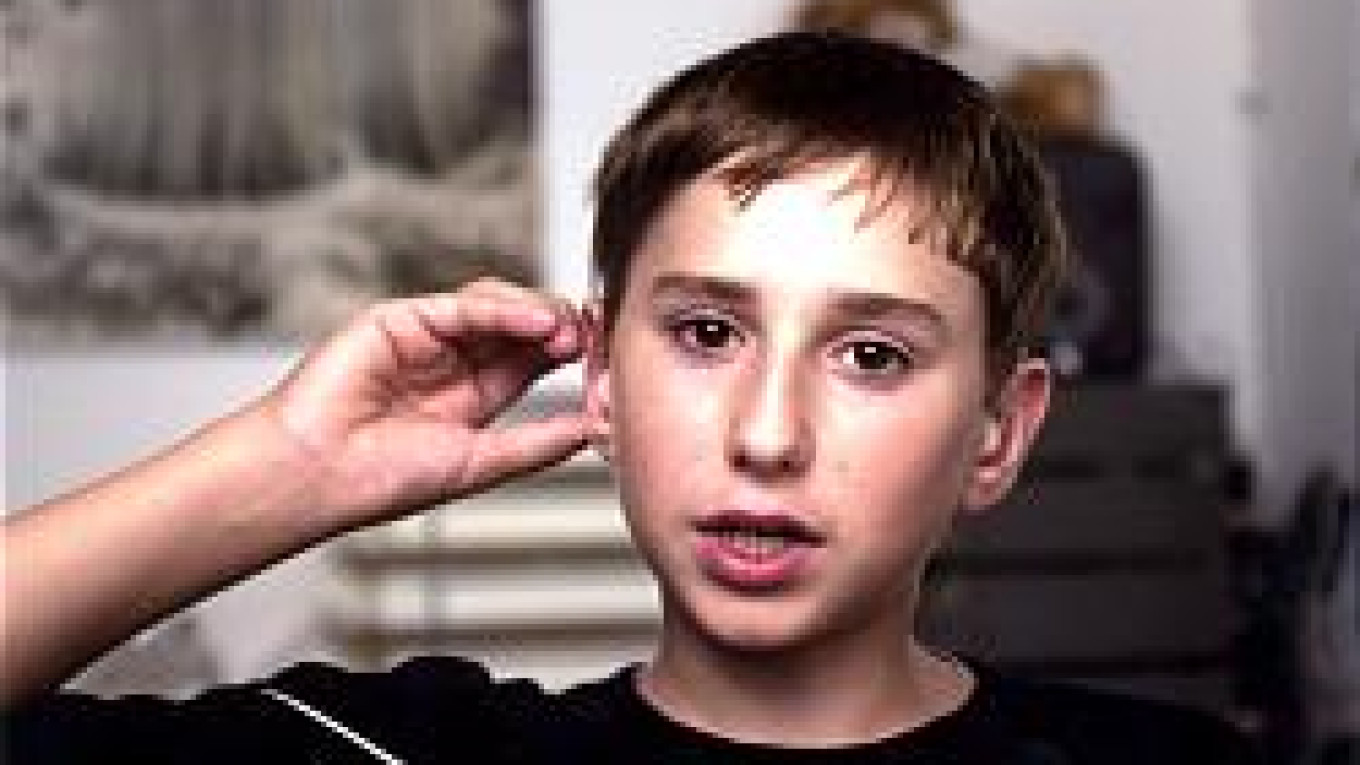The bright 17-year-old, whose talent impressed a group of journalists and hearing specialists at the Danish Embassy last week, was one of 18 young Russians with profound hearing loss recently invited to Denmark to be fitted with a powerful new digital hearing aid.
The children spent a week in early August at a vacation camp outside Copenhagen courtesy of Widex, a Danish-based manufacturer of hearing devices. They were taken there to be fitted with the new P-38 digital aid.
While the most significant results of their new devices will only be seen in a few months, the children seemed thrilled with their newfound ability to hear birds singing and friends talking.
"I can perceive many more sounds that seem more natural," said Pyotr, who talks with a very mild speech impediment and is confident and relaxed. "I play a lot of music, and now I can distinguish different sounds, as well as distant noises. At the moment, I can't hear soft sounds, but I hope to in the future."
Thirteen-year-old Harry Potter fan Sasha Mamadshoyev began suffering hearing loss after taking an antibiotic treatment for a bronchitis infection when he was 9 months old. Already a good student, he said he plans to become the best in his class now that his hearing has improved. Sasha said he can now hear voices in other rooms and understands everything he is told. "I can even hear the sound of the wind," he said.
Masha Tikhonova, also 13, lost much of her hearing as an infant, after a bad reaction to a vaccination against measles, diphtheria and scarlet fever. Most sounds were muffled until the new device was fitted, and she said she was amazed while watching television that she could hear her father speaking behind her.
Emilia Leongard, director of the Leongard Center for the Education and SocioCultural Rehabilitation of Deaf and Hard of Hearing children in Moscow, worked on the initiative with Widex and its partner in Russia, Audiostar. She has worked in the area of deaf education for 47 years and founded the Leongard program of speech rehabilitation for children with hearing problems. This system is used by both teachers and parents in Russia.
Leongard said the most important complications caused by hearing loss are speech problems, which can hinder a child's integration into society.
Teaching deaf children to talk without a large speech impediment is becoming easier. "We are living in a wonderful era of digital aids that can help facilitate a two-way movement of the child toward society and society toward the child," she said.
Being deaf is both a physical and psychological problem, she said. "The families of these children also suffer and can become dysfunctional, and then the child suffers even more," she said. The families often cannot agree on treatment, because there is not a simple, or even a common, solution. The children usually end up in specialist schools that further isolate them from society.
The new devices should help children integrate because the units enable them to follow oral speech. Widex export manager Peter Abiltrup, who worked with the children in Denmark, said the children changed visibly after the aids were fitted, although "some seemed to find the sounds overwhelming."
"We wanted to give these kids a nice weekend in Denmark and give a good impression both of our country and Widex," he said. Sasha, no doubt thinking wistfully of the smog-free air over Copenhagen, said he would like very much to return, as "everything was so nice and clean there."
Palle Rud Pedersen, another regional export manager, said monitoring the children's progress over the next few months would be a vital part of the project. "It'll be interesting to see how it turns out, and it is important to follow the children's speech reproduction and development over time."
However, while these children were lucky enough to benefit from Widex's generosity, at a cost of $850, most hearing-impaired children in Russia will not be so fortunate. Leongard said this price is out of the reach of most parents, and the government only provides nondigital hearing devices. Her organization advises parents to seek sponsors or to try to raise the money from friends and neighbors. She conceded this is neither ideal nor easy but said it can be achieved.
Regardless of financial considerations, Leongard said the future lies with digital hearing aids, which she believes will help deaf children learn to talk without speech impediments. "I think sign language is not good for children," she said. "We must help them become like ordinary children, and they're happier using verbal language. Their parents, teachers and friends will feel the change in their behavior and be glad of it."
Whatever the future may offer these children, it is seemingly insignificant sounds that have clearly had the biggest effect on them. When asked how the aid had affected her life, Masha said, in awe, that for the first time at the dacha: "I could hear the sound of my mother pouring water into a jar."
A Message from The Moscow Times:
Dear readers,
We are facing unprecedented challenges. Russia's Prosecutor General's Office has designated The Moscow Times as an "undesirable" organization, criminalizing our work and putting our staff at risk of prosecution. This follows our earlier unjust labeling as a "foreign agent."
These actions are direct attempts to silence independent journalism in Russia. The authorities claim our work "discredits the decisions of the Russian leadership." We see things differently: we strive to provide accurate, unbiased reporting on Russia.
We, the journalists of The Moscow Times, refuse to be silenced. But to continue our work, we need your help.
Your support, no matter how small, makes a world of difference. If you can, please support us monthly starting from just $2. It's quick to set up, and every contribution makes a significant impact.
By supporting The Moscow Times, you're defending open, independent journalism in the face of repression. Thank you for standing with us.
Remind me later.


